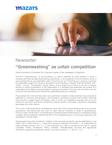
“Greenwashing" as unfair competition
The term "greenwashing", or eco-laundering, is used to describe an unfair practice in which a company promotes its sales by promoting its products, or its companies (in environmental, social or governmental terms), as sustainable, when in fact they are not. Promoting your company or product as sustainable ranges from doing so expressly in your branding or slogans (with the prefixes "eco", "clean", "circular", "sustainable", among others), to the simple use of colors or the use of images alluding to natural ecosystems, or the interposition of a #hashtag that associates the product to a sustainable trend. When choosing between a product promoted in this way and one that is not, the consumer will naturally tend to choose the sustainable product or company.
The problem lies in the fact that, when such promotion is based on false premises, the consumer is subjected to confusion and deception, and chooses to purchase a product when misled. Disloyalty here acquires a special legal connotation, since it occurs for competitive purposes and as an act contrary to good faith and sound commercial customs, aimed at achieving a significant competitive advantage over other traders.
This is not a new phenomenon. Greenpeace, along with other environmental groups and consumer associations, has denounced and sued (in class actions) hundreds of cases of greenwashing. Famous cases include that of a multinational oil company that promoted itself as a renewable energy manager (while its plaintiffs claimed that 96% of its investments were in oil and gas exploration and exploitation), among others.
Greenwashing may also constitute a violation of the consumer protection regime established in Law 1480 of 2011, which aims at "(...) consumers' access to adequate information (...) to enable them to make informed choices" (Art. 1 n. 2) and enshrines as a right of consumers the right to receive "complete, truthful, transparent, timely, verifiable, understandable, accurate and appropriate information regarding the products offered or put into circulation (...)" (Art. 3 n. 1.3).
To avoid the unintentional practice of greenwashing and the legal effects it entails, companies must be able to demonstrate, objectively, that their product, company or supply chain is indeed sustainable. There are multiple seals of social responsibility and sustainability in the market that measure different dimensions of these practices, including the Dow Jones Sustainability Index, certification as a B Corporation, the ISO 26000 standard, the Fenalco Solidario seal, Fairtrade International, Rainforest Alliance and the status of a Benefit and Collective Interest Company (BIC), among others.
The global trend, led by the European Commission, is that companies must report and make public their sustainability activities (in the environmental, social and governance dimensions) through a non-financial statement. This generates transparency regarding the company's true sustainability policy and prevents greenwashing, with its legal, judicial and reputational consequences. As a good practice, companies can voluntarily adopt this report in order to generate credibility and certainty regarding their sustainability policy, vis-à-vis their various stakeholders.


